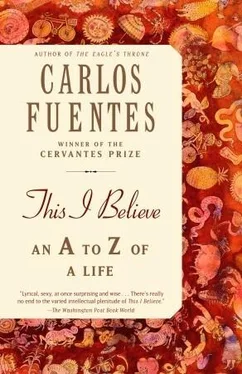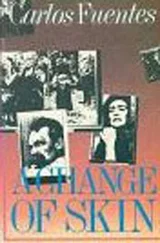The most extraordinary aspect of this inventory is that the millennium that boasts the most significant technological and scientific advancement in history is also the most politically and morally retrograde in all of history. Attila, Nero, and Torquemada were not as cruel as Himmler, Beria, and Pinochet. But nor did they have Einstein or Freud to match up against. The tragedy of the millennium as it drew to a close is that we had every kind of resource imaginable for achieving happiness, yet we violated them all by employing the very worst methods that only served to achieve misery. Fleming, Salk, Watson and Crick, Pauling, Marie Curie: all the great benefactors of the century that so recently came to a close must live forevermore alongside the specter of the criminals of history who had neither the need nor the justification for killing so many millions of people.
Violence in classical tragedy was always depicted as part of humanity’s ethical battle: we are tragic because we are not perfect. The tyrannies of the twentieth century turned tragedy into crime, the tragic crime of contemporary history. The monsters of the political realm denied history the opportunity for redemption through self-knowledge. The victim of the Gulag, of Auschwitz, or an Argentine prison was denied the tragic recognition and simply became a statistic of violence — victim number 9, 9 thousand, or 9 million. . The profound importance of certain writers of the past century — and I think particularly of Franz Kafka, William Faulkner, Primo Levi, and Jorge Semprún — lies in their ability to restore tragic dignity to the victims of criminal history.
Criminal or tragic, when the Cold War ended in 1989, we were told that history too had ended. Given the growing violence in the Balkan states and Chechnya, in Algeria and sub-Saharan Africa, as well as in the Holy Land, the notion of violence as normal and not an exceptional or unusual condition of urban life should have served to deter us from any excessive celebrations on the last day of December 1999 or the first day of January 2000. Neither the greatest nor the most wretched of human conditions cares about calendars. On more luminous days, we will create communication and art, we will achieve startling medical breakthroughs and we will delve into those parts of the infinite universe — without beginning, without end — that remain elusive to us today. We will create friendship and love. But on darker nights, we will allow one third of the human race to die of hunger, we will deny half the children on the planet the right to go to school, and we will prevent women — half the human race — from gaining equal access to employment. We will continue to exploit the natural environment as if our arrogant rapaciousness were trying to prevent the air, water, and forests from outlasting us.
A millennium in which history was no longer one single history — that of the Western world — but incorporated many histories and many cultures. Will the new one be better? This is the question asked of me by my great friend Jean Daniel, and I answer him with these words:
Dear Jean Daniel,
The twentieth century has embraced, to an equal degree, both the promise of a perfectible humanity and the promise of a freedom that, to be truly coherent, would have to include the freedom to do Evil. Century of Einstein and Fleming, and also of Hitler and Stalin. Century of Joyce and Picasso, and also of Auschwitz and the Gulag. Century of scientific light, and also of political darkness. The universality of technology, and also of violence. Progress heretofore unequaled, even in its inequality. Never before in the history of Man has there existed so wide a gulf between the progress of the scientific-technical realm and the barbarity of the moral-political realm. Does the twenty-first century promise something better? We have the right to be skeptical. Or at the very least to define pessimism as a wise man once did: well-informed optimism.
I believe in Ibero-America, Spanish America. For me the Atlantic is not an abyss but a bridge. The waters of the Mediterranean flow from the Bosphorus and Andalucía to the Antilles and the Gulf of Mexico. Ocean of encounters. The first encounter was a collision. The America desired was an America destroyed. The European dream of a new Golden Age perished in the mine, at the hacienda, on the slave ship. Great civilizations crumbled and fell. The conquest of America was a catastrophe. But catastrophe, says María Zambrano, is only catastrophic if it does not allow for redemption. All of us were born out of the catastrophe of conquest. The majority of us are mestizos, mixed-breeds, children of the encounter. The majority of us speak Spanish and Portuguese. And even when we are atheists, we are Catholic. But our Christianity is syncretic, for it sustains, transforms, and deforms the great traditions of the constructive indigenous cultures of Chichén Itzá, Teotihuacán, Mayapán, and Machu Picchu. Indigenous societies with political regimes that were authoritarian, occasionally cruel, exploitative. . and isolated. But at the heart of each one a battle was being waged between the darkness of sacrifice and war (Huitzilopochtli) and the principle of light and creation (Quetzalcoatl). Who would have won out, the son of Coatlicue or the son of the Plumed Serpent? We will never know. The indigenous cultures of America are cultures interrupted, conscious of their fragility—“In vain have we come, passing through the land. At least some flowers, at least some song. .!”—and condemned to surrender out of pure surprise. Prophecies are fulfilled. The Other arrives. We are not alone in the world.
The conquest of America did not give rise to justice but rather, to the universal struggle for justice. Spain is the only colonial power that questions itself about the justice or injustice of its acts. This debate, initiated by the friars Antonio de Montesinos and Bartolomé de las Casas, paved the way for the concept of human rights as universal rights, as proclaimed by Fathers Vitoria and Suárez of Salamanca in the sixteenth century. And out of the racial and cultural interchange a syncretic religious culture would emerge (the idols behind the altars, Holy Mary, mother of both God and the Indians, Jesus Christ, the astonishing God who sacrifices himself rather than asking for sacrifice). A culture that is at times a culture of astonishment, irony, patience, memory, and sometimes resentment. At other times it is a culture of the most generous humility, and the most original and urgent creativity: Kondori, the Indian architect of Peru; Aleijadinho, the mulatto sculptor from Brazil; Sor Juana, the mestiza poet of Mexico. If the Baroque signifies a “horror of the void,” then all the souls in Spanish America filled it. It was different from the European Baroque, the sensual sublimation of the Counter-Reformation. The American Baroque is the art of the Counter-Conquest. It fills the gaping voids of the New World utopia.
Spanish American nationalities emerged both with the colonial regime and against it. The king of Spain was far away; he never even set foot on his vast American dominions — King Juan Carlos I, in fact, is the first Spanish monarch ever to actually visit America. The Laws of the Indies granted protection to the native peoples, but distance and isolation aided the establishment of rural authorities, the great country estates, the exploitation of labor. In Brazil and the Caribbean, the enslaved black population served to replace the decimated indigenous population. The far-away Habsburgs allowed the elite criollos, those born in America but of European descent, to do as they wished. The Bourbons, however, were reformers who were rather too close for comfort, rather too obtrusive, and made the criollos bow to the wishes of the Spanish metropolis. And so the criollo elite, from Buenos Aires and Santiago de Chile to Caracas and Mexico, rose up in simultaneous rebellion in 1810. We had heroes: Bolívar, Hidalgo, San Martín. We had statues.
Читать дальше












